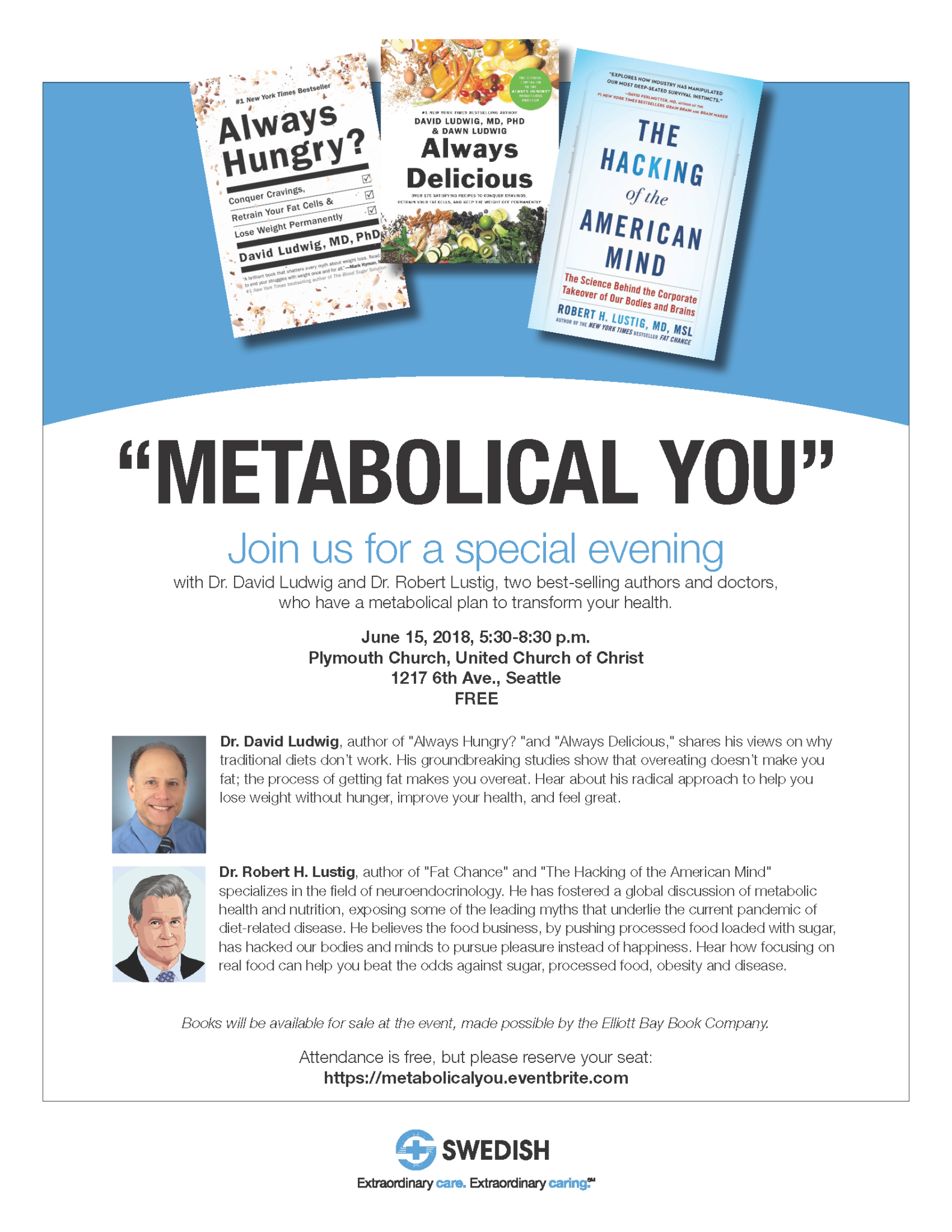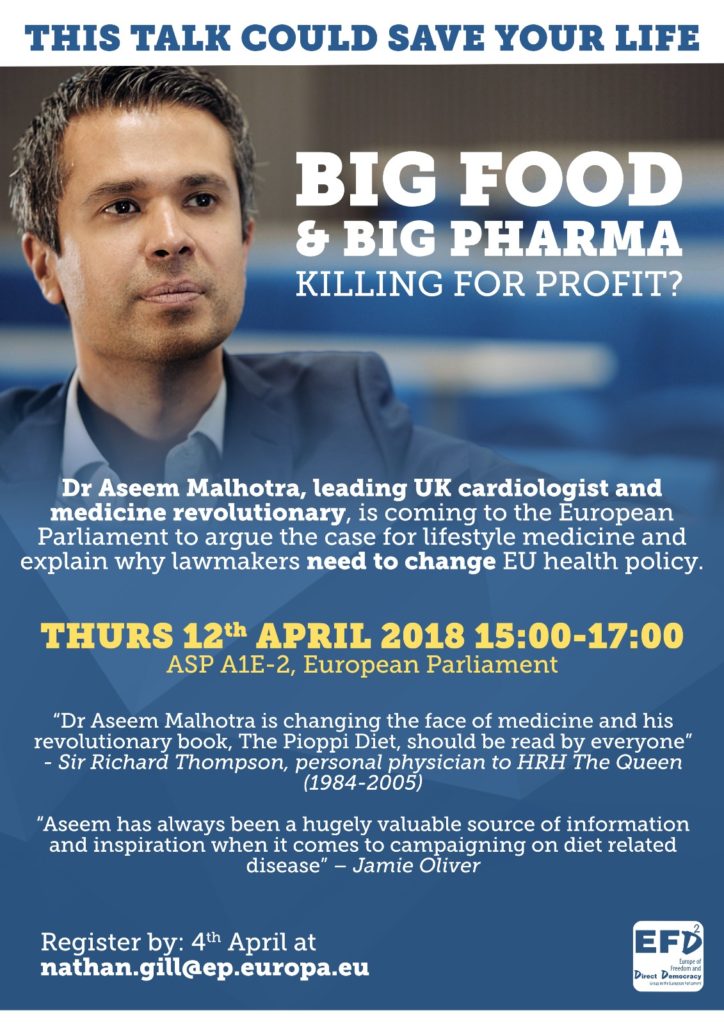
Metabolical You
Looking forward to Metabolical You: an Evening with my colleague, best-selling author, and doctor, Dr. David Ludwig, hosted by Swedish Medical Center.
June 15, 2018, 5:30 PM – 8:30 PM
Plymouth Church, United Church of Christ
Seattle, WA
Support and book sales by Elliott Bay Book Company
I’m in Seattle, June 15-16, 2018 for the Swedish CME summit for health care professionals: Metabolic Health and Nutrition Across the Life Span.
Official Beverage Sponsor: Hint Water



Metabolic Health and Nutrition
- A third or less of doctors get nutrition education in medical school, and those that do, might only take a course or two. There has been a national call for improved nutrition education for doctors since the first dietary guidelines were launched in 1980, based on a 1977 report by the Senate Select Committee on Nutrition called, Dietary Goals for Americans.
- The stats on nutrition education in medical schools are getting worse not better – so the best place, right now, to educate healthcare professionals is in the “after-market” CME framework which is institutionalized and commonplace.
- Unfortunately, CME programs on nutrition have been infiltrated by companies such as Abbott or Nestle, who use their so-called nutrition “institutes” as a front for peddling CME programs / nutrition “education” that is nothing but a vehicle for marketing their sugar-shake products like Ensure or Boost. Even worse, CME programs are promulgated by mainstream healthcare institutions that promote drugs, devices, procedures and outdated nutrition information that is not only wrong, but harmful. Often these CME events are sponsored by big pharmaceutical companies and commercial interests – the CME programs are supposed to have policies in place to prevent influence, but as they say in Spanish, “Con dinero baila el perro.”
So, the dream of a national CME summit that would bring together movers and shakers who are busting paradigms and moving us away from coopted and misinformed (metabolic health and nutrition science) information came true – thanks to Swedish Hospital.
Present at our first CME summit, Pediatric Metabolic Health and Nutrition, (2017) was Dr. Guy Hudson, then Medical Director, and now CEO of Swedish. With a history in pediatrics, he was a natural advocate for our efforts. We focused on the the pediatric population first.
This year (2018), the focus was broadened to Metabolic Health and Nutrition Across the Life Span. In addition to forging out-of-the-box concepts and themes of the CME summit, hosting and facilitating, etc., my colleagues recruited nationally and internationally known talent, and, in order to really bring together a blockbuster group, all speakers were asked to forgo their speaker fees, which they have done, both year one and two, an indication of how much “skin in the game” our CME summit faculty has. Check out the brochure for this event.
There is a free companion event to this year’s CME summit, called “Metabolical You,” features myself and Dr. David Ludwig (our keynote speaker at the CME summit) is also being offered to the general public. Elliott Bay Books is also on board with the event.
Big Food and Big Pharma: Killing for Profit
Recently, I shared information about the efforts of Dr. Aseem Malhotra in the UK.
Here is the complete video recording of the presentation to the European Parliament.
His presentation to the European Parliament was held Thursday, April 12 at 3 PM – 5 PM UTC+02
Dr. Aseem Malhotra spoke to the European Parliament, at the invitation of Nathan Gill MEP for Wales.
Dr. Malhotra invited top leaders in European Medicine to expose “how Big Food and Big Pharma are killing millions of people.”
Dr. Aseem Malhotra, an internationally renowned UK cardiologist and author of the Pioppi Diet, argued the case for lifestyle medicine and explaining why lawmakers need to change EU health policy.
“Prescribed medications are estimated to be the third biggest killer, after heart disease and cancer. Bad Pharma sees millions taking drugs they don’t need – destroying their lives! For years public health advice across Europe has got it dangerously wrong,” Dr. Malhotra states.
Dr. Aseem Malhotra is a leading figure in the campaign against sugar and too much medicine in the UK, and was joined by the director of the Centre of Evidence Based Medicine, University of Oxford, the past President of the Royal College of Physicians and former doctor to the Queen, a internationally known professor of Diabetes, an award winning investigative medical journalist, and an eminent UK nutritionist.
The panel exposed how the food and beverage industry and pharmaceutical companies have had a pervasive influence over policy that coerces doctors into prescribing unnecessary and potentially harmful treatments rather than providing patients with basic lifestyle solutions. In the UK, more than half of all adults take at least one prescription medication with 50% of those over 70 on at least three. It is estimated that prescribed medication is the third most common cause of death after heart disease and cancer. The panel argued that evidence-based medicine has been hijacked by major conflicts of interest at the highest levels, and revealed unscrupulous lobbying practices that drive up profits at the expense of public health.
Dr. Malhotra states: “With global health systems forecast to collapse in the next few years, two things are driving ever-increasing demand: The escalating burden of chronic disease, caused by entirely preventable lifestyle illnesses, and over-treatment, seeing millions taking drugs and undergoing surgeries that will provide zero benefit and as a result costing national economies billions.”
The unified show of force was intended to expose collusion between politicians, respected medical institutions, ‘charities’ and medical journals for financial gain, resulting in an epidemic of misinformation with devastating consequences for health worldwide.

Big Food and Big Pharma: Killing for Profit?
UPDATE: Here is complete video coverage of “Big Food and Big Pharma: Killing for Profit?
Recently, I shared information about the efforts of Dr. Aseem Malhotra in the UK.
Here is a heads up to a special event related to his efforts coming up this Thursday, April 12 at 3 PM – 5 PM UTC+02
Dr. Aseem Malhotra is speaking to the European Parliament, at the invitation of Nathan Gill MEP for Wales.
Dr. Malhotra has invited top leaders in European Medicine to expose “how Big Food and Big Pharma are killing millions of people.”
Dr. Aseem Malhotra, an internationally renowned UK cardiologist and author of the Pioppi Diet, will be arguing the case for lifestyle medicine and explaining why lawmakers need to change EU health policy. “Prescribed medications are estimated to be the third biggest killer, after heart disease and cancer. Bad Pharma sees millions taking drugs they don’t need – destroying their lives! For years public health advice across Europe has got it dangerously wrong,” Dr. Malhotra states.
Dr. Aseem Malhotra is a leading figure in the campaign against sugar and too much medicine in the UK, and will be joined by the director of the Centre of Evidence Based Medicine, University of Oxford, the past President of the Royal College of Physicians and former doctor to the Queen, a internationally known professor of Diabetes, an award winning investigative medical journalist, and an eminent UK nutritionist.
The panel intends to expose how the food and beverage industry and pharmaceutical companies have had a pervasive influence over policy that coerces doctors into prescribing unnecessary and potentially harmful treatments rather than providing patients with basic lifestyle solutions. In the UK, more than half of all adults take at least one prescription medication with 50% of those over 70 on at least three. It is estimated that prescribed medication is the third most common cause of death after heart disease and cancer. The panel will argue that evidence-based medicine has been hijacked by major conflicts of interest at the highest levels, and will reveal unscrupulous lobbying practices that drive up profits at the expense of public health.
Dr. Malhotra states: “With global health systems forecast to collapse in the next few years, two things are driving ever-increasing demand: The escalating burden of chronic disease, caused by entirely preventable lifestyle illnesses, and over-treatment, seeing millions taking drugs and undergoing surgeries that will provide zero benefit and as a result costing national economies billions.”
The unified show of force is intended to expose collusion between politicians, respected medical institutions, ‘charities’ and medical journals for financial gain, resulting in an epidemic of misinformation with devastating consequences for health worldwide.
Facebook Event Link Here for more details.
Promotional Facebook video of the event here.
For all media and press enquiries please contact press officer Alexandra Phillips, at +44 7 888 66 789 3 or alexandra.phillips@europarl.europa.eu
Reference
Dr. Aseem Malhotra’s website: http://doctoraseem.com/

Ignore government guidelines to beat diabetes, obesity, heart disease and save NHS hundreds of millions, UK Prime Minister told.
A news release about Dr. Aseem Malhotra’s work in the U.K.- Released 3-14-18
Government guidelines that advise putting starchy carbohydrates such as bread, pasta, potatoes and rice at base of a recommended diet have are described by Dr. Aseem Malhotra as a “35 year fad that has driven obesity related illness with disastrous consequences for public health”.
By cutting sugar and starchy carbohydrates from his diet, Type 1 diabetic Nathan Gill, Member of the European Parliament (MEP) for Wales, has reduced insulin requirements by 50% and now urges Prime Minister, Theresa May, also a type 1 diabetic to do the same.
New data from diabetes.co.uk reveals that 30,000 type 1 diabetics have reduced insulin requirements by up to 80% simply by cutting out starchy carbohydrates.
MEP Nathan Gill was so astonished by the dramatic changes to his personal health after following eminent cardiologist Dr. Aseem Malhotra’s advice to follow a low carbohydrate high fat diet that he has written an open letter to the Prime Minister Theresa May calling for an urgent overhaul of dietary guidelines that promote low fat foods and advise putting starchy carbohydrates at the base of diet.
“Current government advice recommends that people put starchy carbohydrates at the base of their diet. These guidelines are absolutely wrong and have been a major contributor to the obesity crisis in the UK over the past three decades and the diabetes epidemic. I have now concluded that this advice and the promotion of “low fat” foods promoted in official government advice in 1983 has been a thirty five year diet fad that has replaced millennia of eating satiating and nutritious full fat whole foods with disastrous consequences for public health,” MEP Gill writes.
“After reading eminent British Consultant Cardiologist Dr. Aseem Malhotra’s evidence-based lifestyle medicine book, The Pioppi Diet and having met Dr. Malhotra in person, I cannot express how much my life has changed for the better by following his recommendations that pinpoint sugar consumption above 2 teaspoons a day per adult as potentially damaging to health. Current Government guidelines have allowed for ten times this recommended dietary allowance. My blood sugars are not only significantly more stable, but I have managed to reduce my insulin requirements by almost 50% which, I’m sure you will agree, is quite extraordinary,” MEP Gill tells the Prime Minister.
In the letter MEP Gill mentions that the harms of sugar consumption on health begin after consuming more than 2 teaspoons of sugar a day but research by Dr. Malhotra published in the BMJ in 2013 exposed that food labelling in the UK and Europe had in effect been advising the public to consume 22.5 teaspoons of sugar a day.
Following an investigation by the Sunday Times and Channel 4’s Dispatches it later emerged that several members of the Government’s Scientific Advisory Committee on Nutrition had financial ties to sugar manufacturers.
“Regulators, academic institutions, charities and organizations that have a responsibility to patients and should exhibit the highest standards of transparency and scientific integrity, instead of colluding with big pharmaceutical companies and the food and beverage industry for financial gain – to the severe detriment of public health. As a British citizen, a diabetic and as a politician I find this utterly unacceptable. Having personally improved my own health significantly by ignoring the official government dietary guidelines, which I have now clearly realized are not based on independent science, I urge you to do the same if you are not doing so already,” MEP Gill writes.
MEP Gill states “The history of tobacco control should have taught us that legislation to reduce the availability, affordability and acceptability of smoking had the biggest impact in reducing the consumption of cigarettes, and had this occurred decades earlier, when the first scientific studies linking smoking and lung cancer were published millions of premature deaths from lung cancer and heart disease could have been prevented. I also believe that we all have a role to play in helping to solve the current healthcare crisis. Politicians especially have the greatest impact to ensure that policies are evidence based and through legislation can protect children and the public from the excesses of industries whose primary motive is profit.”
MEP Gill emphasizes the urgency of the problem: “We are also simultaneously facing a crisis of an overmedicated population. In the UK, almost half of all adults are taking at least one prescription medication and 70% of those aged over 75 are on at least three. It is estimated that prescribed medication is the third most common cause of death after heart disease and cancer. With an ongoing funding crisis in the NHS, the future of our public health will necessarily need to shift the balance away from medicines that have at best marginal gains and come with side effects, to that of using lifestyle as a first line intervention. If all diabetic patients were to follow Dr. Malhotra’s recommendations in The Pioppi Diet, and also reduce their dependence on insulin by over 50%, “this would save the NHS hundreds of millions of pounds.”
On Thursday, April 12th, MEP Nathan Gill will host Dr. Malhotra in the European Parliament for a talk titled “Big Food and Big Pharma, Killing for Profit?” where Dr. Malhotra will make the case very clear for why the system needs reform, why lifestyle medicine must be at the forefront of improving global health, and what can be done to better inform the public.
The letter and advice to support the diet and lifestyle recommendations of the Pioppi Diet and ignore current dietary government guidelines has been backed by a number of prominent doctors, dietitians, nurses and columnist and broadcaster Jon Gaunt who has reversed his type 2 diabetes.
Sir Richard Thompson, Immediate Past President of the Royal College of Physicians and Personal Physician to Her Majesty The Queen, 1984-2005, said “Dr. Aseem Malhotra is changing the face of medicine and his revolutionary book, The Pioppi Diet should be read by everyone.”
Hanno Pijl, Professor of Diabetes at the University of Leiden, The Netherlands said “A steadily growing wealth of data supports the benefits of the Pioppi (Mediterranean) lifestyle for our health in general and for type 2 and for type 1 diabetes in particular. My experience as a clinician consistently confirms these data. While “Pioppi like” lifestyle measures can reverse type 2 diabetes in the majority of patients many people with type 1 benefit in terms of glucose control and medication use as well. Drugs are not the answer to lifestyle associated disease. Lifestyle is a choice up to a certain extent but is profoundly affected by the way we organize our community. Therefore our politicians bear a huge responsibility for the health of our future society.”
Arjun Panesar, CEO of Diabetes.co.uk said “Over 30,000 people with type 1 diabetes have joined the Low Carb Program since its launch in 2015. This is very much in line with the Pioppi Diet. Over 10% of the British type 1 diabetes population are members of the program, demonstrating the requirement of appropriate education and support. Data from patients with type 1 diabetes demonstrates reduction in insulin dependency by up to 80%, improvements in hypo and hyper awareness, reduction in hospital admissions, and greater perceived glucose control.”
Jon Gaunt, Columnist and Broadcaster said, “I was a Type 2 Diabetic for over 15 years but in less than 5 months I lost four stone and reversed my diabetes and came off all medications including blood pressure tablets. When my NHS Doctor asked me how I did this I replied, “by ignoring your food guidelines and instead following a Low Carb High fat diet like Dr. Aseem Malhotra suggests in his book The Pioppi Diet. It is clear from my research that the NHS must change its advice now and if it did millions more would lose weight, reverse their Type 2 and save the NHS Millions each year. Animal fat is not the enemy, sugar, processed food and Carbs are.”
Dr. Trudi Deaking PhD, Dietitian and Chief Executive Officer of X-Pert Health said, “Basing the diet on real foods whilst eliminating refined carbs and processed fats as in The Pioppi Diet can drive health benefits through prevention and management of long term conditions such as diabetes, obesity and heart disease. Going on a reduced calorie diet will damage your metabolism resulting in eventual weight gain. Achieve your health goals by eliminating snacks and eating non processed foods packed with nutrients. This simple advice can heal patients and save lives.”
Raquel Britzke, Registered Dietitian said, “In my own clinical experience a dietary pattern that restricts processed and refined carbohydrate foods whilst promoting whole fat foods as advised in The Pioppi Diet is most definitely the best approach to manage both type 1 and type 2 diabetes in addition to sustainable weight loss for those suffering with obesity. Current government dietary guidelines are flawed and need an urgent update. In particular advising diabetic patients to base their diet on carbohydrates such as pasta has had harmful consequences. It’s time to take a step back and look at the real world application of these recommendations.”
Sarah Ann Macklin, nutritionist and journalist said, “It’s clear from the rising epidemic of obesity ( which was set by the government to be reduced by 2021) and type 2 diabetes that current dietary guidelines are not working. Diets low in saturated fat and high in refined carbohydrates have an adverse effect on blood lipids and insulin levels. Addition attention to calorie counting is also misguiding our nation’s health. The Pioppi Diet which focuses on a diet rich in healthy fats such as omega 3, quality protein and whole fruit and vegetables supports all the scientific literature of combating obesity and reducing the risk of cardiovascular disease and diabetes when compared to the standard western diet.”
Lynda Sackett Clinical Research Nurse at the Countess of Chester Hospital said, “On September 12, 2017, my husband Mike suffered a massive heart attack after a particularly vigorous exercise session at the rowing club. He had joined the rowing club on the basis that he could burn more calories and lose weight. He had been overweight for most of his adult life following a diet that most of think of as healthy, based around starchy carbs, with a little of what you fancy! As a Research Nurse, I immediately started reading around the latest research on nutrition and this led me thankfully to Aseem Malhotra and the Pioppi Diet book. What immediately impressed me was the high level of evidence that supported this way of eating and we decided before leaving CCU that we would start following the principles of the diet. Mike’s angioplasty the night of his heart attack showed up areas of atherosclerosis which they said would need to be addressed at a later date by means of stenting or bypass depending on whether the area damaged by the heart attack had died or not. After 12 weeks of following the Pioppi Diet we discovered that he no longer needed this intervention and that he had managed to reverse a lot of the damage. I am convinced that his diet played a huge part in his recovery. We now eat a diet that is high in natural fats, vegetables and a moderate amount of protein and we are both at a healthy weight for the first time in many years. The main bonus for us has been that we both feel completely replete after meals and have no desire to snack or eat any sugary snacks. As a Research Nurse, I am very keen to become involved in research to help others reverse conditions such as metabolic syndrome and type 2 diabetes as it is now a subject I feel extremely passionate about having seen first-hand the huge benefits to health. Had my husband been on a low fat diet, he would have fallen off the proverbial wagon within a week. The sustainability of this way of life is what will help people to take charge of their own health without the need for suffering and deprivation.”
Richard Stantiford, Director of Take Heart Group, Cardiac Rehabilitation, Royal Sussex Hospital said, “We now have a small cohort of recovering cardiac patients with type 2 diabetes (many with Metabolic Syndrome) enthusiastically following the dietary principles outlined in The Pioppi Diet. They’re engaging in regular CV exercise but all have reported significant weight loss since the beginning of January 2018 when they switched from the current “Eat Well” guidelines to the Pioppi low carb Mediterranean Diet. As well as visible reduced abdominal fat, many have improved HbA1c, lowered triglycerides and seen modest improvements in HDL-C. The changes are remarkable and all of the patients feel so much better already and are extremely happy with their progress. Thanks Dr. Aseem Malhotra! We are now planning on encouraging more patients to adopt a “Pioppi” based approach to healthy eating.”
For all media and press enquiries please contact press officer Alexandra Phillips, at +44 7 888 66 789 3 or alexandra.phillips@europarl.europa.eu
Visit Dr. Aseem Malhotra’s website here: http://doctoraseem.com/
Reference:
The Key to Weight Loss Is Diet Quality, Not Quantity, a New Study Finds (NYT)
Christopher Gardner and his team are to be congratulated for completing this 12-month study, featured in the New York Times. It shows getting rid of processed food helps promote weight loss, irrespective of carb or fat composition of the diet. However, the Low-Carb diet was 30% carb, 45% fat. Most LCHF diets are 20% carb, 60% fat or more. I don’t think this study adequately tests Low-Fat vs. Low-Carb, and I don’t think you can dismiss insulin response as a triaging factor without an adequate Low-Carb diet.
Study:
Do you believe a calorie is a calorie?
The food industry vigorously promotes the myth “a calorie is a calorie.” But a calorie is NOT a calorie.
This dangerous lie is easily disproven through these FOUR EXAMPLES:
Fiber. You eat 160 calories in almonds, but only absorb 130—because some fiber calories pass through without metabolizing. Vegetables, greens, beans and whole grains are all high in fiber.
Protein. It takes twice as much energy to metabolize protein as carbs, so protein spends more calories in processing. And, protein makes you feel full longer.
Fat. All fats are 9 calories per gram. But omega-3 fats are heart-healthy and will save your life. Trans-fats will clog your arteries and kill you. Eat more fish, nuts, avocados, olive oil and eggs. Avoid most processed foods.
Added Sugar. Calories from added sugar are different from other calories, and are jeopardizing health worldwide. And yes that includes honey, syrup and High Fructose Corn Syrup (HFCS). Excess added sugar leads to, diabetes, heart disease, and fatty liver disease, unrelated to its calories. Avoid processed foods and sodas; they’re loaded with added sugar.
There’s an irrefutable link shown between diabetes and added sugar.
My colleagues Dr. Sanjay Basu, Paula Yoffe, Nancy Hills and I asked:
“What in the world’s food supply explains diabetes rates, country-by-country, over the last decade?”
We melded numerous databases worldwide measuring food availability and diabetes prevalence.
WE FOUND: Only changes in sugar availability explained changes in diabetes prevalence worldwide; nothing else mattered. We assessed total calories from protein, fat, fiber, natural sugar (from fruit) and added sugar (from sugar crops, sweeteners and soda).
We found that total caloric availability was unrelated to diabetes prevalence; for every extra 150 calories per day, diabetes prevalence rose by only 0.1 percent. But if those 150 calories were from added sugar, diabetes prevalence rose 11-fold, by 1.1 percent.
Yet Coca-Cola created their Coming Together campaign saying, “All calories count.” They want you to believe the lie that a calorie is a calorie. The food industry will try to sow the seeds of doubt. But they cannot refute the science.
THE GOOD NEWS: In our study, countries where sugar availability fell showed decreases in type 2 diabetes. The UK and Australia have already laid down stricter guidelines for sugar consumption. Americans are growing wary of added sugar and the food industry. The U.S. Dietary Guidelines Committee has now suggested a recommended limit on added sugar at 10% of calories. The cost of inaction is a future where one-in-three Americans have diabetes. Politicians must step up to establish programs that make eating healthy more than a personal goal—it must become a national priority.
For a great infographic on this topic, click here.


